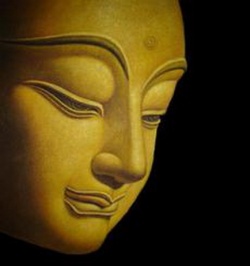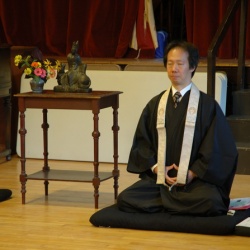Difference between revisions of "The Light of Wisdom and Truth"
(Created page with "thumb|250px| <poem> by Zuio H. Inagaki The Light of Wisdom radiates boundlessly. Of all living beings with limited capacities, There is none untouch...") |
|||
| Line 3: | Line 3: | ||
by Zuio H. Inagaki | by Zuio H. Inagaki | ||
| − | The Light of Wisdom radiates boundlessly. | + | The [[Light]] of [[Wisdom]] radiates boundlessly. |
| − | Of all living beings with limited capacities, | + | Of all [[living beings]] with limited capacities, |
| − | There is none untouched by the Light. | + | There is none untouched by the [[Light]]. |
| − | Take refuge in the Illuminating Truth. (Jodo Wasan 2) | + | Take [[refuge]] in the [[Illuminating]] [[Truth]]. ([[Jodo]] Wasan 2) |
| − | Amida is the Buddha of Light. Light signifies wisdom, as T'an--luan, the Third Master, says: 'The Buddha's Light is the manifested form of wisdom.' Since Amida's Light is boundless and immeasurable, he is also called 'the Buddha of Immeasurable Light.' | + | [[Amida]] is the [[Buddha]] of [[Light]]. [[Light]] signifies [[wisdom]], as T'an--luan, the Third [[Master]], says: 'The [[Buddha's]] [[Light]] is the [[manifested]] [[form]] of [[wisdom]].' Since Amida's [[Light]] is [[boundless]] and [[immeasurable]], he is also called 'the [[Buddha]] of [[Immeasurable]] [[Light]].' |
[[File:1urlnb.jpg|thumb|250px|]] | [[File:1urlnb.jpg|thumb|250px|]] | ||
| − | In our world of experience everything is finite. We are limited physically, mentally and spiritually, and our surrounding conditions are finite. However lofty the ideals or however profound the philosophies we may conceive, they are limited in scope and depth. Our spiritual capacities are limited, too. Our efforts to attain the highest Enlightenment are bound to fail as long as we are relying on our own limited resources. The perennial problem for us is that we are reluctant to admit that we are limited in every sense of the term. It is, however, undeniable that we have a strong aspiration for the infinite; we seek to attain eternal life, limitless pleasure and happiness, unrestricted movement, and so forth. Does Pure Land Buddhism respond to such desires? | + | In our [[world]] of [[experience]] everything is finite. We are limited physically, [[mentally]] and [[spiritually]], and our surrounding [[conditions]] are finite. However lofty the ideals or however profound the [[philosophies]] we may conceive, they are limited in scope and depth. Our [[spiritual]] capacities are limited, too. Our efforts to attain the highest [[Enlightenment]] are bound to fail as long as we are relying on our own limited resources. The [[perennial]] problem for us is that we are reluctant to admit that we are limited in every [[sense]] of the term. It is, however, undeniable that we have a strong [[aspiration]] for the [[infinite]]; we seek to attain [[eternal life]], limitless [[pleasure]] and [[happiness]], unrestricted movement, and so forth. Does [[Pure Land]] [[Buddhism]] respond to such [[desires]]? |
| − | The Pure Land is described in the sutras as the Land of Utmost Bliss, where those who have been born are free from suffering and can enjoy various pleasures. Their life-span is immeasurable and their physical glory is exquisite and beyond description. As such, the Pure Land appears to be little different from any utopia we may imagine. Indeed, many people are sceptical about the nature of the Pure Land, thinking, for instance, that the narrative of Amida Buddha is to give us hope and encourage us to do good deeds - even though he does not really exist. | + | The [[Pure Land]] is described in the [[sutras]] as the Land of Utmost [[Bliss]], where those who have been born are free from [[suffering]] and can enjoy various [[pleasures]]. Their life-span is [[immeasurable]] and their [[physical]] glory is exquisite and beyond description. As such, the [[Pure Land]] appears to be little different from any utopia we may [[imagine]]. Indeed, many [[people]] are sceptical about the [[nature]] of the [[Pure Land]], [[thinking]], for instance, that the {{Wiki|narrative}} of [[Amida]] [[Buddha]] is to give us hope and encourage us to do [[good deeds]] - even though he does not really [[exist]]. |
| − | The Three Pure Land Sutras and discourses by the Seven Masters and Shinran teach us that the Pure Land is an 'actually existing' realm firmly grounded in True Suchness, that our empirical existence is delusory and produced by the ignorance which lies in the depth of the mind, and that our desires and aspirations, however noble, are inevitably 'polluted' by ignorance and misguided by 'inverted' notions. | + | The Three [[Pure Land]] [[Sutras]] and discourses by the Seven [[Masters]] and [[Shinran]] teach us that the [[Pure Land]] is an 'actually [[existing]]' [[realm]] firmly grounded in [[True Suchness]], that our [[empirical]] [[existence]] is delusory and produced by the [[ignorance]] which lies in the depth of the [[mind]], and that our [[desires]] and aspirations, however [[noble]], are inevitably 'polluted' by [[ignorance]] and misguided by 'inverted' notions. |
| − | Amida's Light of Wisdom constantly shines upon us, dispelling the darkness of ignorance in our hearts and illuminating the path we should follow. | + | Amida's [[Light]] of [[Wisdom]] constantly shines upon us, dispelling the darkness of [[ignorance]] in our hearts and [[illuminating]] the [[path]] we should follow. |
| − | A question may be asked. 'We cannot see Amida's Light. How can we perceive it?' | + | A question may be asked. 'We cannot see Amida's [[Light]]. How can we perceive it?' |
| − | The answer is: 'Through hearing the Name.' | + | The answer is: 'Through [[hearing]] the Name.' |
| − | The Light and the Name equally represent the entire personality, power and virtue of Amida Buddha. If the Light is considered as the visible form of the Name, the Name is the audible or voiced form of the Light. These two work together to awaken us to Amida's all-pervasive and all-saving activity. 'Hearing the Name and receiving joyous faith' (Larger Sutra) is the only path open to us. 'Hearing' leads to contemplation and understanding of Amida's Wisdom and Compassion and liberates us, once and for all, from our limited views of life and the world. | + | The [[Light]] and the Name equally represent the entire [[personality]], [[power]] and [[virtue]] of [[Amida]] [[Buddha]]. If the [[Light]] is considered as the [[visible]] [[form]] of the Name, the Name is the audible or voiced [[form]] of the [[Light]]. These two work together [[to awaken]] us to Amida's all-pervasive and all-saving [[activity]]. '[[Hearing]] the Name and receiving [[joyous]] [[faith]]' (Larger [[Sutra]]) is the only [[path]] open to us. '[[Hearing]]' leads to [[contemplation]] and understanding of Amida's [[Wisdom]] and [[Compassion]] and liberates us, once and for all, from our limited [[views]] of [[life]] and the [[world]]. |
</poem> | </poem> | ||
{{R}} | {{R}} | ||
Revision as of 00:06, 4 September 2013
by Zuio H. Inagaki
The Light of Wisdom radiates boundlessly.
Of all living beings with limited capacities,
There is none untouched by the Light.
Take refuge in the Illuminating Truth. (Jodo Wasan 2)
Amida is the Buddha of Light. Light signifies wisdom, as T'an--luan, the Third Master, says: 'The Buddha's Light is the manifested form of wisdom.' Since Amida's Light is boundless and immeasurable, he is also called 'the Buddha of Immeasurable Light.'
In our world of experience everything is finite. We are limited physically, mentally and spiritually, and our surrounding conditions are finite. However lofty the ideals or however profound the philosophies we may conceive, they are limited in scope and depth. Our spiritual capacities are limited, too. Our efforts to attain the highest Enlightenment are bound to fail as long as we are relying on our own limited resources. The perennial problem for us is that we are reluctant to admit that we are limited in every sense of the term. It is, however, undeniable that we have a strong aspiration for the infinite; we seek to attain eternal life, limitless pleasure and happiness, unrestricted movement, and so forth. Does Pure Land Buddhism respond to such desires?
The Pure Land is described in the sutras as the Land of Utmost Bliss, where those who have been born are free from suffering and can enjoy various pleasures. Their life-span is immeasurable and their physical glory is exquisite and beyond description. As such, the Pure Land appears to be little different from any utopia we may imagine. Indeed, many people are sceptical about the nature of the Pure Land, thinking, for instance, that the narrative of Amida Buddha is to give us hope and encourage us to do good deeds - even though he does not really exist.
The Three Pure Land Sutras and discourses by the Seven Masters and Shinran teach us that the Pure Land is an 'actually existing' realm firmly grounded in True Suchness, that our empirical existence is delusory and produced by the ignorance which lies in the depth of the mind, and that our desires and aspirations, however noble, are inevitably 'polluted' by ignorance and misguided by 'inverted' notions.
Amida's Light of Wisdom constantly shines upon us, dispelling the darkness of ignorance in our hearts and illuminating the path we should follow.
A question may be asked. 'We cannot see Amida's Light. How can we perceive it?'
The answer is: 'Through hearing the Name.'
The Light and the Name equally represent the entire personality, power and virtue of Amida Buddha. If the Light is considered as the visible form of the Name, the Name is the audible or voiced form of the Light. These two work together to awaken us to Amida's all-pervasive and all-saving activity. 'Hearing the Name and receiving joyous faith' (Larger Sutra) is the only path open to us. 'Hearing' leads to contemplation and understanding of Amida's Wisdom and Compassion and liberates us, once and for all, from our limited views of life and the world.

